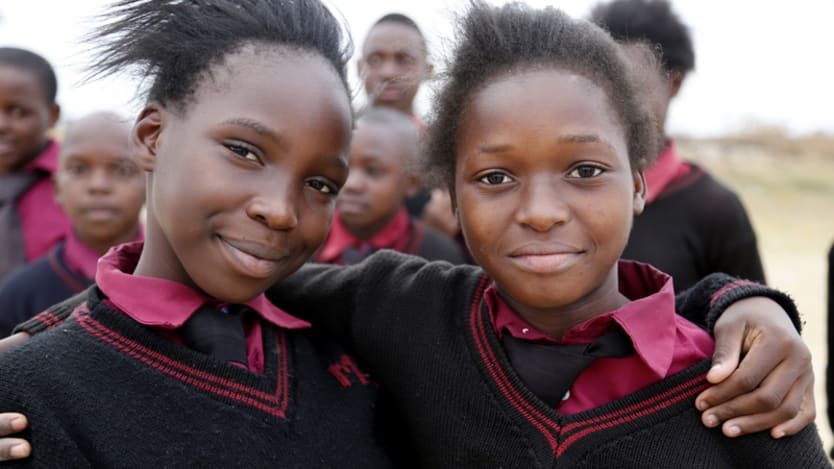
“It is considered normal for a girl to drop out of school, to not go out of the house to meet her friends, to not play, to get married early, to have children and to not question any of this,” said
Neelam, 15, a member of a collective of adolescent girls formed by CREA and Mahila Mandal in Jharkhand, India.
Neelam gives a voice to the day-to-day reality of about 700 million women around the world — approximately 10 percent of the world’s population — married before their 18th birthday. Of these, approximately 250 million were married before the age of 15. If the present trends continue over the next decade, 150 million more girls will be married before they are 18.
According to the United Nations Convention on the Rights of the Child, child marriage — marriage under the age of 18 — is a fundamental human rights violation. Child marriage disproportionately affects young girls, who are more likely to be married as children than young boys.
Furthermore, girls married young are more vulnerable to intimate partner violence, physical violence and sexual abuse. Child brides are often unable to effectively negotiate safer sex, leaving themselves vulnerable to sexually transmitted infections, including HIV, along with early pregnancy.
Socio-cultural norms often restrict women and girls to make decisions related to their bodies, health, education, well-being and lives. Deep-rooted attitudes and practices of son preference lead to girls being devalued right from their birth and affect their access to services, opportunities and rights. This manifests in early and forced marriages, sexual abuse and harassment, violence and limited and unequal access to opportunities in socio-cultural, educational, economic and political spheres.
See more stories on child marriage and girls’ rights:
► The hefty price of child marriage
► We cannot fail to empower girls before they become women
► EU must help change the world for girls
► How land rights can help end child marriage
► A dangerous clause to ‘legally’ decrease child marriage in Bangladesh
Exposed to such negative conditions, women and girls commonly lack self-confidence and opportunities that can help enhance their leadership skills. This is often linked to the lack of knowledge or stigma and shame about their sexuality. The silence on sexuality in communities makes it even more difficult for young people to access relevant information on bodies, bodily changes, sex, contraception, health, and reproduction. Traditional practices continue to discriminate against women, even when there are laws in place to protect women’s rights.
Without underpinning women’s empowerment and gender equality, we cannot hope to make any kind of progress. Thankfully with the adoption of Sustainable Development Goals, the world has taken cognizance of the intersectionality of empowerment of women with poverty eradication, economic growth and lasting protection of the planet.
The 2030 agenda identifies gender inequality as one of the key challenges and affirms that realizing gender equality and empowerment of women and girls is critical for the progress of the goals and targets.
Even though gender equality can contribute to poverty reduction, economic growth, and effective governance, the reverse like rising incomes, democratic political participation, and peace do not necessarily enhance women’s rights and empowerment. Thus a collective responsibility for achieving gender equality, women’s rights and women’s empowerment requires specific policy attention and action.
This involves holistic multifaceted interventions that address the issues of health, education, and violence faced by women and girls, but also address and integrate complex realities of gender, sexuality, religion, caste and class as experienced not only in South Asia but across the “global south.”
Child and early forced marriage is a complex issue with root causes in oppressive patriarchal and socio-cultural norms of gender and sexuality and in unequal power structures of caste, class and religion.
A big part of CREA’s work has been to develop and widely disseminate publications and resources, in English and Hindi, in the fields of violence against women, gender, and human rights. We have been able to work directly with women and girls, families, service providers and other community stakeholders to raise awareness and increase understanding about existing norms, mindsets and practices that perpetuate inequality, discrimination and violence against women and girls. Influencing the U.N. processes has been one of the strategies used to effect broad-based change.
However, for any kind of interventions to succeed, attention has to be paid to developing agency of young women to make decisions related to their bodies, health and lives. It is necessary and urgent to create a culture of consent, where opinions, attitudes and views of adolescent and young girls are valued right from the beginning. The interventions must be rights-affirming, participatory and inclusive for all women and girls. Ultimately, the realities of girls and women must inform legal and policy making processes and implementation mechanisms.
How can an intentional, integrated approach to the design, delivery and evaluation of programs make an enduring difference in people’s lives? Devex, in partnership with FHI 360, aims to advance the global conversation on the promise offered by integrated development solutions through #IntegratedDev. Visit the campaign site and join the conversation using #IntegratedDev.




